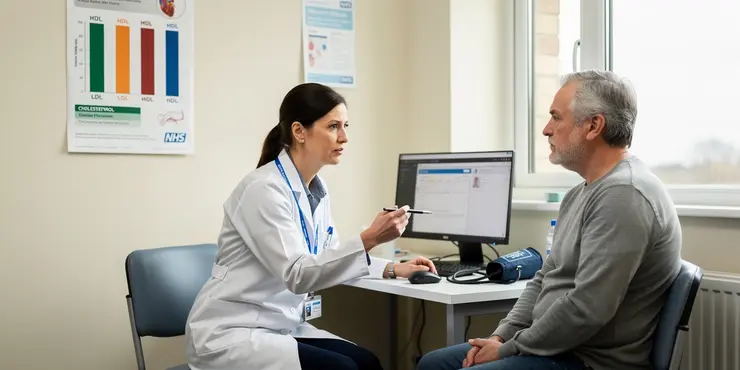
Find Help
More Items From Ergsy search
-

What is Aspirin?
Relevance: 100%
-

Is Paracetamol the same as Aspirin?
Relevance: 93%
-

Are Aspirin and Ibuprofen the same?
Relevance: 93%
-

What are the side effects of Aspirin?
Relevance: 91%
-
Can aspirin interact with other medications?
Relevance: 88%
-

Can aspirin stop colorectal cancer?
Relevance: 87%
-

Can I take Aspirin and Ibuprofen together?
Relevance: 86%
-

Can aspirin help in reducing the risk of strokes?
Relevance: 86%
-

Is aspirin recommended for everyone to prevent colorectal cancer?
Relevance: 85%
-
Is aspirin effective in preventing other types of cancer?
Relevance: 85%
-
Has the FDA approved aspirin for cancer prevention?
Relevance: 85%
-

Which one is better for headaches: Aspirin or Paracetamol?
Relevance: 84%
-
Should individuals with certain medical conditions avoid aspirin?
Relevance: 83%
-

Is it safe to use aspirin to treat chickenpox symptoms?
Relevance: 83%
-

What is the difference between Aspirin, Paracetamol, and Ibuprofen?
Relevance: 83%
-

How does aspirin work to reduce cancer risk?
Relevance: 83%
-

Has aspirin been proven to cure colorectal cancer?
Relevance: 83%
-

What dosage of aspirin is considered effective for cancer prevention?
Relevance: 83%
-
What is the difference between aspirin, paracetamol, and ibuprofen?
Relevance: 82%
-

What should I do if I'm considering aspirin for cancer prevention?
Relevance: 81%
-

Should people with a family history of colorectal cancer take aspirin?
Relevance: 80%
-
How long do studies suggest taking aspirin for cancer prevention?
Relevance: 79%
-

What do health organizations say about aspirin and cancer prevention?
Relevance: 79%
-
Is aspirin more effective for certain age groups in preventing colorectal cancer?
Relevance: 78%
-

What is Aspirin?
Relevance: 74%
-

Can aspirin prevent colorectal cancer?
Relevance: 64%
-

Are there risks associated with taking aspirin regularly?
Relevance: 63%
-
Are there ongoing studies about aspirin and colorectal cancer?
Relevance: 61%
-

Which medication should be avoided for children with fevers?
Relevance: 43%
-
Do over-the-counter medications help in preventing heart attacks and strokes?
Relevance: 43%
-

What drugs can reduce the risk of heart-attack and strokes?
Relevance: 32%
-

What drugs are commonly prescribed to reduce the risk of heart attacks?
Relevance: 32%
-

Do all studies agree on aspirin's effectiveness in preventing colorectal cancer?
Relevance: 31%
-

Heart Attack Stories | NHS
Relevance: 28%
-
Are there specific medications that can cause tinnitus?
Relevance: 27%
-

Why might someone choose Paracetamol over NSAIDs?
Relevance: 27%
-

When should one start taking medication for heart attack prevention?
Relevance: 26%
-

What should I do if I'm experiencing heart attack symptoms?
Relevance: 26%
-

What is the treatment for chickenpox?
Relevance: 26%
-

Heart Attack Stories | NHS
Relevance: 26%
Introduction to Aspirin
Aspirin, also known as acetylsalicylic acid, is a widely used medication that has been a staple in households for over a century. Originally derived from the bark of the willow tree, aspirin is part of a group of medicines known as non-steroidal anti-inflammatory drugs (NSAIDs). It is commonly used to relieve pain, reduce inflammation, and lower fever.
Uses of Aspirin
Aspirin has a variety of uses, which can be broadly categorized into three areas: pain relief, anti-inflammatory effects, and cardiovascular protection. For pain relief, aspirin is often used to alleviate headaches, toothaches, and muscle pain. Due to its anti-inflammatory properties, it is also effective in treating conditions like arthritis. Aspirin's ability to thin the blood makes it a valuable medication for preventing blood clots, thereby reducing the risk of strokes and heart attacks. Low-dose aspirin is commonly prescribed to individuals at risk of these conditions to maintain heart health.
How Aspirin Works
Aspirin works by inhibiting the production of certain natural substances in the body that cause inflammation and pain. It blocks the action of an enzyme called cyclooxygenase (COX), which is responsible for producing prostaglandins—compounds that promote inflammation, pain, and fever. By reducing the production of prostaglandins, aspirin effectively decreases these symptoms. Additionally, aspirin’s blood-thinning effect is the result of its ability to inhibit platelet aggregation, which helps prevent blood clots from forming.
Potential Side Effects
While aspirin is effective for many, it is not without potential side effects. Some people may experience gastrointestinal issues, such as stomach pain or ulcers, due to its effect on the stomach lining. It can also increase the risk of bleeding, which is why it should be used cautiously in individuals with clotting disorders. Allergies to aspirin can manifest as hives, swelling, or potentially more severe reactions. As with any medication, it is important to use aspirin as directed and consult with a healthcare professional if any adverse effects occur.
Who Should Avoid Aspirin?
Not everyone should take aspirin. It is generally advised that children and teenagers with viral infections avoid aspirin due to the risk of Reye’s syndrome, a rare but serious condition. Those with a history of stomach ulcers or active gastrointestinal bleeding should also avoid aspirin. Individuals who are pregnant, breastfeeding, or taking anticoagulant medications should consult their doctor before using aspirin due to potential risks and interactions.
Conclusion
Aspirin remains an essential medication with diverse applications in pain relief and cardiovascular protection. However, its use should always be guided by careful consideration of its benefits and potential risks. For any questions regarding its use, consulting a healthcare professional is encouraged to ensure it is appropriate and safe for individual health needs.
Introduction to Aspirin
Aspirin is a common medicine that has been used for over 100 years. It originally came from the bark of a tree called the willow tree. Aspirin helps with pain, swelling, and fevers. It is part of a group of medicines called NSAIDs.
Uses of Aspirin
Aspirin is used for three main reasons: to help stop pain, to reduce swelling, and to protect the heart. For pain, people use aspirin for headaches, toothaches, and sore muscles. It also helps with problems like arthritis because it reduces swelling. Aspirin keeps the blood from clotting, which is good for the heart and can help stop strokes and heart attacks. Doctors often tell people to take low doses of aspirin for heart protection.
How Aspirin Works
Aspirin works by stopping your body from making certain chemicals that cause pain and swelling. It blocks an enzyme called COX. This enzyme helps make things that cause swelling and fever. By stopping these, aspirin helps you feel better. Aspirin also makes the blood thinner, which stops clots from forming.
Potential Side Effects
While aspirin helps many people, it can also cause problems. Some people might have stomach pain or even ulcers because aspirin can hurt the stomach lining. It might also cause more bleeding, so be careful if you bleed easily. Some people are allergic to aspirin. Allergies can show up as hives, swelling, or other bad reactions. Always use aspirin as your doctor tells you, and talk to a doctor if you have problems.
Who Should Avoid Aspirin?
Not everyone can take aspirin. Children and teenagers with viral infections should not take it because it might cause a serious illness called Reye’s syndrome. People with stomach ulcers or bleeding problems should avoid aspirin. If you are pregnant, breastfeeding, or taking blood thinners, ask your doctor if you can take aspirin.
Conclusion
Aspirin is a helpful medicine for pain and heart health, but it must be used carefully. Always consider its benefits and risks. If you have questions about using aspirin, talk to a doctor to make sure it is safe for you.
Frequently Asked Questions
What is Aspirin?
Aspirin is a medication used to reduce pain, fever, or inflammation.
How does Aspirin work?
Aspirin works by blocking the production of certain natural substances in your body that cause inflammation and pain.
What is the chemical name of Aspirin?
The chemical name of Aspirin is acetylsalicylic acid.
Is Aspirin an NSAID?
Yes, Aspirin is classified as a nonsteroidal anti-inflammatory drug (NSAID).
What are the common uses of Aspirin?
Aspirin is commonly used to relieve headaches, muscle pain, arthritis, and to reduce fever.
Can Aspirin prevent heart attacks?
Aspirin can be used to prevent heart attacks in certain people by thinning the blood and preventing clot formation.
Who should not take Aspirin?
People with certain conditions, such as bleeding disorders or aspirin allergies, should not take Aspirin.
Is Aspirin safe for children?
Aspirin is generally not recommended for children due to the risk of Reye's syndrome, a rare but serious illness.
Can you take Aspirin if you are pregnant?
Aspirin should be used cautiously during pregnancy and only if recommended by a doctor.
What are the side effects of Aspirin?
Common side effects include stomach pain, heartburn, and indigestion. Severe side effects may include allergic reactions and bleeding.
Can Aspirin cause an allergic reaction?
Yes, some people may experience an allergic reaction to Aspirin, which can include symptoms like hives, swelling, and difficulty breathing.
How should Aspirin be stored?
Aspirin should be stored at room temperature, away from moisture and heat.
What should I do if I miss a dose of Aspirin?
If you miss a dose, take it as soon as you remember. If it's almost time for your next dose, skip the missed dose.
What happens if I overdose on Aspirin?
An overdose of Aspirin can be very serious. Symptoms may include ringing in the ears, confusion, and difficult breathing. Immediate medical attention is necessary.
Can Aspirin be taken with alcohol?
It is generally not recommended to mix Aspirin with alcohol as it can increase the risk of stomach bleeding.
Is Aspirin the same as Tylenol?
No, Aspirin and Tylenol (acetaminophen) are different medications. While both relieve pain and fever, they work in different ways.
Can Aspirin cause stomach ulcers?
Long-term use of Aspirin can increase the risk of developing stomach ulcers and gastrointestinal bleeding.
How is low-dose Aspirin different from regular Aspirin?
Low-dose Aspirin refers to taking smaller doses to reduce the risk of heart attack and stroke, while regular doses are used for pain and inflammation.
Can I take Aspirin with other medications?
Consult with a healthcare provider before combining Aspirin with other medications, as it can interact with many drugs including blood thinners.
Does Aspirin expire?
Yes, like most medications, Aspirin has an expiration date. It should be used before this date for maximum effectiveness.
What Is Aspirin?
Aspirin is a kind of medicine. It can help if you have a headache or if you are in pain. Some people take aspirin to help their hearts stay healthy.
If you find reading hard, you can:
- Ask someone to read with you.
- Use a tool that reads out loud.
- Look at pictures to help understand.
Aspirin is a medicine that helps if you hurt, feel hot, or are swollen.
How does Aspirin work?
Aspirin is a type of medicine. It helps if you have a headache or your muscles hurt.
Aspirin makes it stop hurting. It does this by getting in the way of something in your body called chemicals. These chemicals can make your head or body hurt more.
If you have aches and pains, aspirin might help you feel better.
Remember, it is best to ask a grown-up or a doctor before taking any medicine.
Aspirin helps stop pain and swelling in the body. It does this by blocking some natural chemicals that cause these problems.
What is the chemical name of Aspirin?
Aspirin's chemical name is long and hard to say: it's "acetylsalicylic acid."
Here are some ideas to help learn this name:
- Break it into parts: a-cetyl-sali-c-ylic acid.
- Say it out loud a few times.
- Use a drawing or rhyme to remember it.
- Ask someone to help you.
The full name for Aspirin is acetylsalicylic acid.
Is Aspirin a Pain Medicine?
Aspirin is a type of medicine. It helps to stop pain. It can also help with fever and swelling. Medicines like this are called NSAIDs. This stands for Non-Steroidal Anti-Inflammatory Drugs.
If you are not sure about the medicine, you can:
- Ask a doctor or nurse
- Read the label on the bottle
- Look up information with a caregiver
These steps can help you understand more.
Yes, Aspirin is a type of medicine called a nonsteroidal anti-inflammatory drug. That's a big name, but we often just call it an NSAID.
Here’s a tip to help you understand: NSAIDs help lower swelling and pain in your body.
If you find big words hard, try using tools that read words out loud to you, or ask someone to read together with you. This can make learning new words easier and more fun!
What is Aspirin used for?
Aspirin is a kind of medicine you can take for several reasons:
- It can help when you have a headache or toothache.
- It helps if you have a fever by making you feel cooler.
- Some people take it to keep their hearts healthy.
If you need help reading, you can ask a friend or use an audio tool to listen to this information.
Aspirin is a medicine. It helps if you have a headache or your muscles hurt. It can also help with arthritis, which is a kind of joint pain. Aspirin can also lower a fever, so it helps when you are too hot and sick.
If it’s hard to understand words, you can ask someone to explain them. You can also use tools that read the words out loud to you.
Can Aspirin help stop heart attacks?
Some people use aspirin to help stop heart attacks. It can make your blood move more easily. But aspirin is not for everyone. Always talk to a doctor first.
Tools and tips to help:
- Ask a doctor or nurse if you have questions.
- Use pictures or videos to learn more.
- Write down new words and what they mean.
Aspirin can help stop heart attacks in some people. It does this by making the blood thinner, so it doesn't form clots.
Who Should Not Take Aspirin?
Aspirin is not for everyone. Some people should not take it.
Here are some people who should not take aspirin:
- People who are allergic to aspirin.
- Children under 12 years old.
- People with stomach ulcers.
- People who have bleeding problems.
If you are unsure, ask a doctor or a nurse.
Doctors and nurses can use easy tools to help you understand.
Some people should not take Aspirin. This includes people who have problems with bleeding or who are allergic to Aspirin.
Can children take aspirin safely?
Aspirin is a type of medicine. It is not safe for children to take unless a doctor says it is okay. It can make children very sick with something called Reye's syndrome. This is a serious illness.
If your child is in pain or has a fever, ask a doctor what medicine they should take. Medicines like acetaminophen (Tylenol) or ibuprofen (Advil) are often safer for children.
Always talk to a doctor before giving any medicine to a child.
Helpful Tools:
- Ask a pharmacist or doctor for advice on safe medicines for children.
- Read medicine labels carefully to make sure they are for children.
Aspirin is not good for children. It can make them very sick with something called Reye's syndrome. This is a rare but very serious illness.
Can you take Aspirin when you are having a baby?
If you are going to have a baby, talk to your doctor before taking Aspirin. Aspirin might not be safe. Your doctor will tell you what to do.
You can ask questions if you do not understand. Use pictures or videos to help you learn more. You can also ask someone to read with you.
If you are going to have a baby, take aspirin carefully. Only take it if your doctor says it's okay.
What happens if you take Aspirin?
Aspirin can help with pain and fever, but it can also cause some problems. These problems are called side effects. Here are some side effects:
- Your tummy might hurt.
- You might feel like throwing up.
- Your skin might get red or itchy.
- You might get a headache.
- If you bleed, it might take longer to stop.
If you feel any of these, tell an adult or a doctor. They can help you.
To make reading easier, you can use a tool that reads the words out loud or helps you understand them better.
Some people might get a tummy ache, feel like their chest is burning, or their food does not sit well in their stomach. These are common side effects.
If you have a bad reaction or start bleeding, that is more serious. Talk to a doctor if this happens.
To help understand and remember this, try using pictures or simple notes. You can also ask someone you trust for help. A good technique is to read out loud.
Can Aspirin make you have an allergy?
Yes, some people can be allergic to Aspirin. This means it can make them sick. They might get itchy bumps on their skin, have swelling, or find it hard to breathe.
To stay safe, it is good to use tools like pictures to show symptoms. Asking a doctor or an adult you trust for help is important, too!
How to Keep Aspirin Safe
Here is how you can keep aspirin safe and ready to use:
- Cool Place: Put aspirin in a cool place. Not too hot. - Dry Spot: Keep it dry. Do not put it where it's wet or damp. - Closed Container: Always close the bottle or box tight. - Out of Reach: Make sure kids can't reach it.If you need help, ask a grown-up or use a reminder app to check the storage.
Keep aspirin in a cool, dry place. Don't let it get hot or wet.
What do I do if I forget to take my Aspirin?
If you forget to take your Aspirin, don't worry. Just take it as soon as you remember.
If it is almost time for your next dose, skip the dose you missed. Do not take two doses at the same time.
To help you remember to take your Aspirin, you can:
- Use a pill box with days of the week
- Set an alarm on your phone
- Ask someone you trust to remind you
If you forget to take your medicine, take it when you remember. But if it is almost time for your next medicine, do not take the one you missed.
What if I take too much Aspirin?
If you take too much Aspirin, it can make you sick. It's important to get help right away.
Signs of taking too much:
- Tummy ache
- Dizzy or confused
- Feeling sick or throwing up
- Ringing in your ears
- Fast breathing
What to do:
- Tell an adult
- Call a doctor or emergency services
- Follow their instructions
Tips to stay safe:
- Only take the amount the doctor says
- Use labels or a checklist to keep track
Taking too much Aspirin is very dangerous. It can make your ears ring, make you feel confused, and make it hard to breathe. If this happens, you need to see a doctor right away.
Is it safe to take aspirin with alcohol?
Aspirin is a medicine that helps when you hurt or if you have a fever.
Alcohol is in drinks like beer and wine.
It's best not to take aspirin and drink alcohol at the same time. They can make your tummy feel bad.
If you are ever not sure, ask a doctor or someone who knows a lot about medicine.
Use pictures or videos to learn more.
You should not take Aspirin and drink alcohol together. This can hurt your stomach and make it bleed.
Are Aspirin and Tylenol the same?
No, Aspirin and Tylenol are not the same.
Aspirin is a medicine that can help with pain and swelling.
Tylenol is a different kind of medicine that helps with pain and fever.
If you need help taking medicine, you can ask an adult or a doctor.
No, Aspirin and Tylenol (which is also called acetaminophen) are not the same. Both help with pain and fever, but they work differently inside the body.
Does Aspirin hurt your tummy?
Aspirin is a common medicine. Some people take it when they are in pain or to keep their heart healthy.
But taking aspirin can sometimes hurt your tummy. It might cause a sore called an ulcer. An ulcer is like a little hole inside your tummy.
Here are some ways to help:
- Ask a grown-up, like a doctor or pharmacist, if aspirin is safe for you.
- Eat some food before taking aspirin. This can help protect your tummy.
- If you feel tummy pain, stop taking aspirin and tell a grown-up.
Always talk to a doctor before starting new medicine. They can help you stay safe and well.
Taking Aspirin for a long time can hurt your tummy. It can make holes in your stomach and cause bleeding inside you.
What is the difference between low-dose Aspirin and regular Aspirin?
Aspirin is a medicine that can help when you are sick.
There are two kinds of Aspirin: low-dose and regular.
Low-dose Aspirin is a smaller amount. It is like taking a small bite.
Regular Aspirin is a bigger amount. It is like taking a big bite.
Doctors give low-dose Aspirin to help keep your heart healthy.
You might get regular Aspirin if you have a headache or fever.
If you find reading hard, ask someone you trust to read with you.
Using apps can help make reading easier.
Low-dose Aspirin means taking a small amount of medicine. It helps lower the chance of having a heart attack or a stroke. Regular or normal doses of Aspirin are used to help with pain and swelling.
Can I take Aspirin with other medicines?
Before you take Aspirin with other medicines, ask your doctor or a pharmacist. They can tell you if it's safe.
Sometimes, taking medicines together can cause problems. It's important to be sure.
Here are some tips to help you remember:
- Write down the names of your medicines.
- Show this list to your doctor or pharmacist.
- Ask questions if you are not sure.
- Use a pill box to keep track of your medicines.
Talk to your doctor or nurse before taking Aspirin with other medicines. Aspirin can mix with many drugs, like those that make your blood thinner.
Does Aspirin go bad?
Aspirin can go bad over time. Check the date on the bottle. If it's past that date, don't use it.
Here are some tips to remember:
- Look at the date on the bottle.
- If the pill looks different or smells bad, don't take it.
- Ask a doctor or pharmacist if you are not sure.
Yes, like most medicines, Aspirin has a date when it stops working well. You should use it before this date so it works best.
Useful Links
This website offers general information and is not a substitute for professional advice.
Always seek guidance from qualified professionals.
If you have any medical concerns or need urgent help, contact a healthcare professional or emergency services immediately.
Some of this content was generated with AI assistance. We’ve done our best to keep it accurate, helpful, and human-friendly.
- Ergsy carfully checks the information in the videos we provide here.
- Videos shown by Youtube after a video has completed, have NOT been reviewed by ERGSY.
- To view, click the arrow in centre of video.
- Most of the videos you find here will have subtitles and/or closed captions available.
- You may need to turn these on, and choose your preferred language.
- Go to the video you'd like to watch.
- If closed captions (CC) are available, settings will be visible on the bottom right of the video player.
- To turn on Captions, click settings .
- To turn off Captions, click settings again.
More Items From Ergsy search
-

What is Aspirin?
Relevance: 100%
-

Is Paracetamol the same as Aspirin?
Relevance: 93%
-

Are Aspirin and Ibuprofen the same?
Relevance: 93%
-

What are the side effects of Aspirin?
Relevance: 91%
-
Can aspirin interact with other medications?
Relevance: 88%
-

Can aspirin stop colorectal cancer?
Relevance: 87%
-

Can I take Aspirin and Ibuprofen together?
Relevance: 86%
-

Can aspirin help in reducing the risk of strokes?
Relevance: 86%
-

Is aspirin recommended for everyone to prevent colorectal cancer?
Relevance: 85%
-
Is aspirin effective in preventing other types of cancer?
Relevance: 85%
-
Has the FDA approved aspirin for cancer prevention?
Relevance: 85%
-

Which one is better for headaches: Aspirin or Paracetamol?
Relevance: 84%
-
Should individuals with certain medical conditions avoid aspirin?
Relevance: 83%
-

Is it safe to use aspirin to treat chickenpox symptoms?
Relevance: 83%
-

What is the difference between Aspirin, Paracetamol, and Ibuprofen?
Relevance: 83%
-

How does aspirin work to reduce cancer risk?
Relevance: 83%
-

Has aspirin been proven to cure colorectal cancer?
Relevance: 83%
-

What dosage of aspirin is considered effective for cancer prevention?
Relevance: 83%
-
What is the difference between aspirin, paracetamol, and ibuprofen?
Relevance: 82%
-

What should I do if I'm considering aspirin for cancer prevention?
Relevance: 81%
-

Should people with a family history of colorectal cancer take aspirin?
Relevance: 80%
-
How long do studies suggest taking aspirin for cancer prevention?
Relevance: 79%
-

What do health organizations say about aspirin and cancer prevention?
Relevance: 79%
-
Is aspirin more effective for certain age groups in preventing colorectal cancer?
Relevance: 78%
-

What is Aspirin?
Relevance: 74%
-

Can aspirin prevent colorectal cancer?
Relevance: 64%
-

Are there risks associated with taking aspirin regularly?
Relevance: 63%
-
Are there ongoing studies about aspirin and colorectal cancer?
Relevance: 61%
-

Which medication should be avoided for children with fevers?
Relevance: 43%
-
Do over-the-counter medications help in preventing heart attacks and strokes?
Relevance: 43%
-

What drugs can reduce the risk of heart-attack and strokes?
Relevance: 32%
-

What drugs are commonly prescribed to reduce the risk of heart attacks?
Relevance: 32%
-

Do all studies agree on aspirin's effectiveness in preventing colorectal cancer?
Relevance: 31%
-

Heart Attack Stories | NHS
Relevance: 28%
-
Are there specific medications that can cause tinnitus?
Relevance: 27%
-

Why might someone choose Paracetamol over NSAIDs?
Relevance: 27%
-

When should one start taking medication for heart attack prevention?
Relevance: 26%
-

What should I do if I'm experiencing heart attack symptoms?
Relevance: 26%
-

What is the treatment for chickenpox?
Relevance: 26%
-

Heart Attack Stories | NHS
Relevance: 26%


